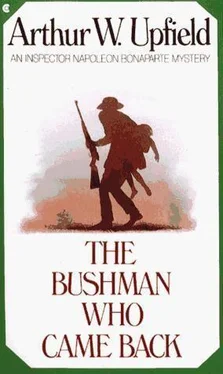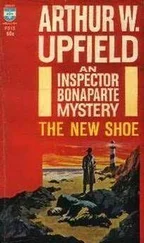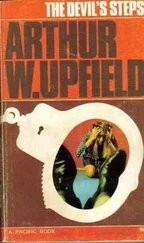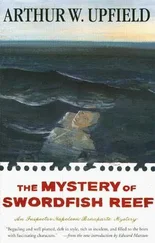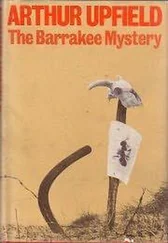Arthur Upfield - The bushman who came back
Здесь есть возможность читать онлайн «Arthur Upfield - The bushman who came back» весь текст электронной книги совершенно бесплатно (целиком полную версию без сокращений). В некоторых случаях можно слушать аудио, скачать через торрент в формате fb2 и присутствует краткое содержание. Жанр: Классический детектив, на английском языке. Описание произведения, (предисловие) а так же отзывы посетителей доступны на портале библиотеки ЛибКат.
- Название:The bushman who came back
- Автор:
- Жанр:
- Год:неизвестен
- ISBN:нет данных
- Рейтинг книги:4 / 5. Голосов: 1
-
Избранное:Добавить в избранное
- Отзывы:
-
Ваша оценка:
- 80
- 1
- 2
- 3
- 4
- 5
The bushman who came back: краткое содержание, описание и аннотация
Предлагаем к чтению аннотацию, описание, краткое содержание или предисловие (зависит от того, что написал сам автор книги «The bushman who came back»). Если вы не нашли необходимую информацию о книге — напишите в комментариях, мы постараемся отыскать её.
The bushman who came back — читать онлайн бесплатно полную книгу (весь текст) целиком
Ниже представлен текст книги, разбитый по страницам. Система сохранения места последней прочитанной страницы, позволяет с удобством читать онлайн бесплатно книгу «The bushman who came back», без необходимости каждый раз заново искать на чём Вы остановились. Поставьте закладку, и сможете в любой момент перейти на страницу, на которой закончили чтение.
Интервал:
Закладка:
“But you believe this silly magic?”
“Canute, Head Man. Murtee, Medicine Man.”
Wootton sensed the utter finality of this statement.
“I’ll advance the tobacco, Meena. Tell Canute it will be a plug short next ration day. And tell Charlie and Rex to come back to work. Mustering to be done. They’ve been loafing around too long.”
Meena looked down at the seated man, encountering frankly his hard green eyes and sensing the powerful magnetism of the white man. She smiled as though because of his surrender, but knew there had been no surrender.
When in Loaders Springs next day, Wootton mentioned the tobacco incident to Constable Pierce, who seemed less sceptical than the cattleman, but agree it was a good tale to spin for a plug of tobacco.
However, the aborigines were right on the mark. At the third dawning following the announcement made by Canute per Meena, Detective Inspector Napoleon Bonaparte was seated against one of the pine trees overlooking the Mount Eden homestead, and down in the house yards was a riding hack and pack-horse which had brought him from the south two hours previously.
The stars were fading, and from the abyss below the ridge appeared a pavement of molten lead. Then it was as though lead ran in streams and rivers, was poured into bar-moulds, and soon all these isolated sheets of metal fused into a great plain of lead, spreading to the east, the north, and the south, until the vast slate supported the dome of the greening sky. When fan-tails of light further illuminated the sky, the sheen of the leaden expanse beneath faded, cold, ugly, inert.
There before Napoleon Bonaparte was The-Sea-That-Was; its headlands and its bays and its inlets, the coast stretching to the south and to the north, its level, silent surface of mud destitute of vegetation all the way to the far horizon, and farther still. Lake Eyre! The last puddle, sometimes to be filled with river water from the north, of The-Sea-That-Was, a puddle sixty miles wide and a hundred long.
Down in the viscous mud lie the bones of monstrous reptiles and animals, and man-catching birds. Along the curving shores, buried by drifting sand, are the mounds of shell fish gathered by the ancestors of Canute’s tribe for feasts that kept them fat for generations.
What is geographically named ‘the Lake Eyre Basin’ roughly comprises two hundred thousand square miles, and most of it is below sea level. Save along the western edge, where run the rare trains northward to Alice Springs, the white population is less than two hundred, and the aborigines number but a hundred more. The rivers, when they run every decade or so, run uphill. Sand dunes float in the air and kangaroos leap from cloud to cloud. The horizon is never where it ought to be. A tree one moment is a shrub, and the next a radio mast. A reptilian monster sunning itself on a mountain ridge is, after all, a frilled lizard sprawled on the dead branch of a tree partially buried in a sand dune.
In this deceitful land a man and a child had vanished.
That had been an Everest of a problem for Senior Constable Pierce, and Bony, who came five weeks later, had to concede much to the policeman’s reputation as a bushman and to all those many white men who had joined in the search. A deceitful land, yet it would not deceive any one of them to whom an area of two hundred thousand square miles would be on a par with a square mile of city blocks to the city dweller.
A man must eat, and during the hot summer months could not live a day without water. He dare not move a mile from water without carrying a supply, and water sources, other than the bores and at homesteads, were few indeed, after eleven rainless months. Every remaining supply had been watched by men whose eyes wouldn’t fail to register the tracks of wild dogs, aborigines, cattle, and, if unable to decipher smoke signals, would note the whereabouts of aborigines, either in their wild state or semi-civilized. Were Ole Fren Yorky still alive, and there was no expressed doubt that he was, he had achieved remarkable success in eluding the finest desert men on earth.
They had been the prospectors trying to locate a man and a child. Now that Bony was arrived, he was, perforce, the mining engineer who would have to delve beneath the surfaces of this deceitful land.
So that when he came to Mount Eden after all prospecting had been done, he didn’t fork a horse and race it here and there, or board a jeep and add to the normal dust, because it was apparently assumed that Yorky and the child were not lost, and, because of Yorky’s bush experience, were not dead of thirst. Therefore, lives and planes hadn’t been risked.
There were facts that could not be denied, and facts that could be assumptions, and assumptions that could be facts. A woman had been shot with a. 44 rifle, and her daughter had been abducted from the homestead. A man seen near the homestead on the morning of the crime had left tracks within a few yards of the position of the body. When last seen, he had been carrying a. 44 Winchester rifle.
The weekly windstorm raged that day, and those few tracks were sheltered from the wind by the homestead buildings. The man, with the child, had gained a lead over the searchers of some twenty hours, and overD. I. Bonaparte, five weeks.
Not a man had seen them since that day. Not one searcher had found a track left by either man or child, no tell-tale fire site, no sign of them whatsoever. Facts were few, assumptions many. One was that Yorky hadn’t shot the mother and abducted the child, but that one of the five white men had returned that day, had shot the woman, with Yorky as witness, and the child also. Then had taken Yorky and the child to a distant place, and buried the bodies at the front of a moving sand dune, so placing the full responsibility on Ole Fren Yorky.
The all-seeing eagles knew the answer, as did the crows. The eagles this early morning came low to espy the stranger seated under the green tops of the pine trees, and the crows were equally interested, but quickly gave up when knowing he was alive. They indulged in insatiable curiosity in the stranger’s horses down in the yards, and in two women who were trudging towards the house from the direction of the aborigines’ camp. Some of the crows flew out a little way over Lake Eyre, and returned as though fearful, while several others continued on over the lake until Bony wondered if they intended to cross to the hidden shore beyond.
When smoke issued from a house chimney, Detective Inspector Bonaparte walked from the ridge down to the homestead of Mount Eden.
Chapter Four
Mount Eden Welcomes Bony
OFALLCanute’s subjects, numbering forty-three, only Sarah had not the slightest fear of him, and what fear, engendered by inherited instincts, she had of Murtee the Medicine Man was rarely manifest. She was one-fifth white, and four-fifths black, and all that her father contributed was a softening of the aboriginal lines of her features, and an acute sense of humour. It is told that before Canute was blinded by a grass fire, she laughed at him when in a towering rage, and that when Canute rushed at her, brandishing a waddy, she took it from him and knocked him cold, then stood over him and hugged herself tightly while laughing down at the silent one. It is also told of Sarah that in punishment Canute put the ban of silence on her, and she kicked him in the stomach and laughed right heartily.
Now that Sarah was cooking at ‘government house’, she and Meena rose early and arrived at the kitchen near enough to six every morning. It was her job first to prepare the morning tea which Meena took to Mr Wootton, whom she would surely find seated at the transceiver and talking with a neighbour.
This morning the fire had been lit and the water was simmering in the wide-bottomed kettle, and Meena was busily tidying the living-room, when there stepped into the kitchen one Sarah had never seen. She noted his lean dark face, the deep blue eyes, the white teeth, and the smile, the clean white shirt tucked into brown gabardine slacks. She said:
Читать дальшеИнтервал:
Закладка:
Похожие книги на «The bushman who came back»
Представляем Вашему вниманию похожие книги на «The bushman who came back» списком для выбора. Мы отобрали схожую по названию и смыслу литературу в надежде предоставить читателям больше вариантов отыскать новые, интересные, ещё непрочитанные произведения.
Обсуждение, отзывы о книге «The bushman who came back» и просто собственные мнения читателей. Оставьте ваши комментарии, напишите, что Вы думаете о произведении, его смысле или главных героях. Укажите что конкретно понравилось, а что нет, и почему Вы так считаете.
